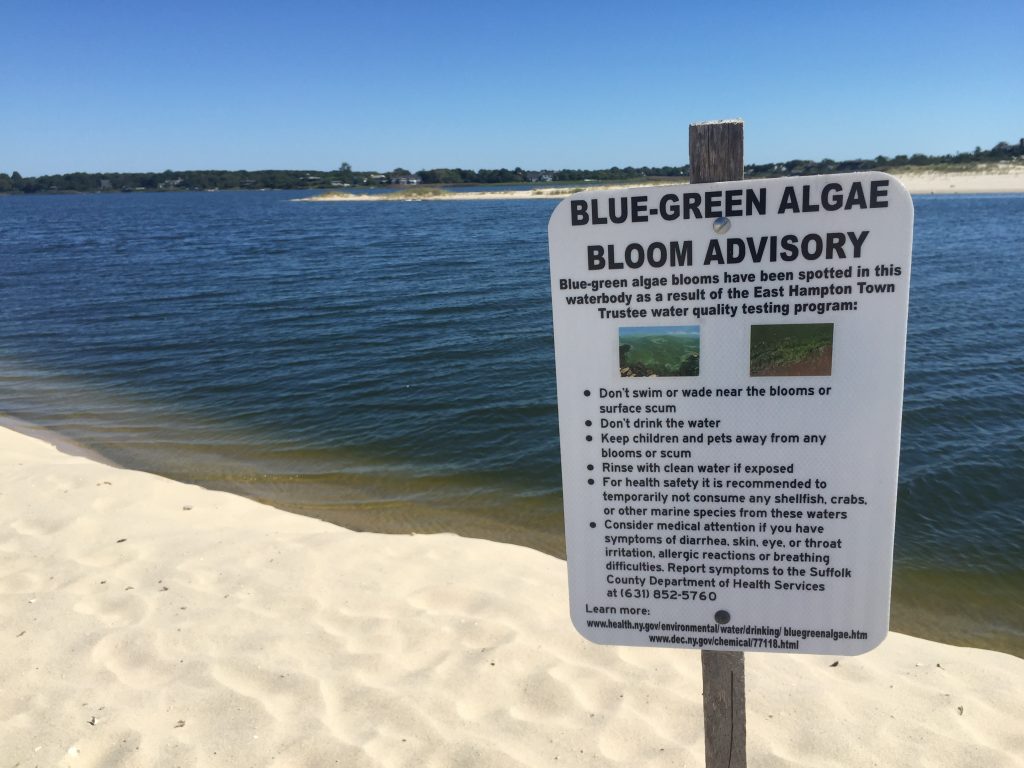
Surfrider Foundation just released its 2016 Clean Water Report, which highlights the Blue Water Task Force and Ocean Friendly Garden programs for Surfrider chapters nationwide. Due to our momentum in the Water Quality Movement, it included a case study of our chapter!
The Eastern Long Island Chapter: Building community support for solving water pollution problems by engaging local partners and students.
Nobody can deny the beauty of Eastern Long Island. That becomes extremely noticeable during the summer months when traffic fills our streets and we begin to notice the effects of continuous pressure on our waterways. To protect the integrity of our coastlines, our chapter empowers volunteers, students, and other organizations to fight for what we love.
In recent years, we have seen an increased incidence of Blue-Green Algae Blooms in our ponds, lakes and bays. These blooms are largely caused by excessive nitrogen coming from septic systems that don’t properly treat wastewater and by fertilizers that are applied to agricultural fields and residential lawns. The blooms wreak havoc on local fisheries and aquatic ecosystems, and pose serious health risks in recreational waters.
During 2013, the Eastern Long Island Chapter joined forces with another NGO, the Concerned Citizens of Montauk, to test bacteria levels at local ocean and bay beaches and freshwater ponds, lakes and creeks. The resulting water quality information is shared to inform local management decisions in the Town of East Hampton and to provide safety information to beachgoers. The Suffolk County Department of Health monitors life-guarded ocean and bay beaches during July and August only, so the chapter’s year-round Blue Water Task Force (BWTF) program was designed to fill in the subsequent data gaps.
As interest and support for their water testing program grew, the chapter also launched a second BWTF lab with help from another local partner, the Peconic Baykeeper, to cover sites further west in the Town of Southampton. Dr. Chris Gobler is allowing the chapter to process water samples out of his lab at the Stony Brook University School of Marine and Atmospheric Sciences. Dr. Gobler has performed extensive research on water quality, harmful algal blooms, and their causes and impacts here on Long Island, and the chapter is excited to share lab space with him. The chapter and their partners are currently monitoring 38 sites on a weekly basis during the summer, and monthly from October through May in the Towns of East Hampton and Southampton.
The chapter also launched its Ocean Friendly Gardens program during 2016 with the support of three family foundation grants and the FOND Group marketing agency. A demonstration garden was installed in a highly visible location in the central green of the Amagansett Square shopping center, with design and installation donated by Marders Nursery and Landscaping. The garden captures the roof runoff from one of the retail buildings and showcases how native and climate appropriate plants can be used to build beautiful landscapes that support clean water.
The chapter has also planted a second Ocean Friendly Garden in partnership with East Hampton Village and the Ladies Village Improvement Society. Three bio-swales were designed by Piazza Horticultural to collect and filter road runoff in the central Village Green before it enters the adjacent surface waters of Town and Hook Ponds. Last fall the Village altered the grading of the green to improve drainage, and the chapter installed the bioswales early this spring once all adjustments to grading were completed.
In order to maximize the impact of their programs, the chapter also started hosting clean water workshops this past year, bringing interested adults and children to the beach to get their hands wet to collect their own water samples and to discuss ways everyone can pitch in – at home, work or school – to help prevent pollution at the beach. It was really inspiring for the chapter volunteers to see just how interested and engaged the participants were in the topic. The workshops were also a great platform to discuss positive policy changes that the chapter was advocating for, such as the extension of a Community Preservation Fund to pay for water quality improvement projects and changes to the Suffolk County Sanitary Code to allow new de-nitrifying septic technologies for commercial and residential applications.
With their grant support, the chapter was also fortunate to work with filmmaker and professional surfer Mikey Detemple, to make the short film Into the Sea. By featuring local community members and landscapes, the film makes the connection between how we manage our lawn and gardens at home and the health of local waterways. It promotes personal responsibility for making changes to protect our own health and to prevent pollution from contaminating Long Island’s bays, ponds and ocean.




